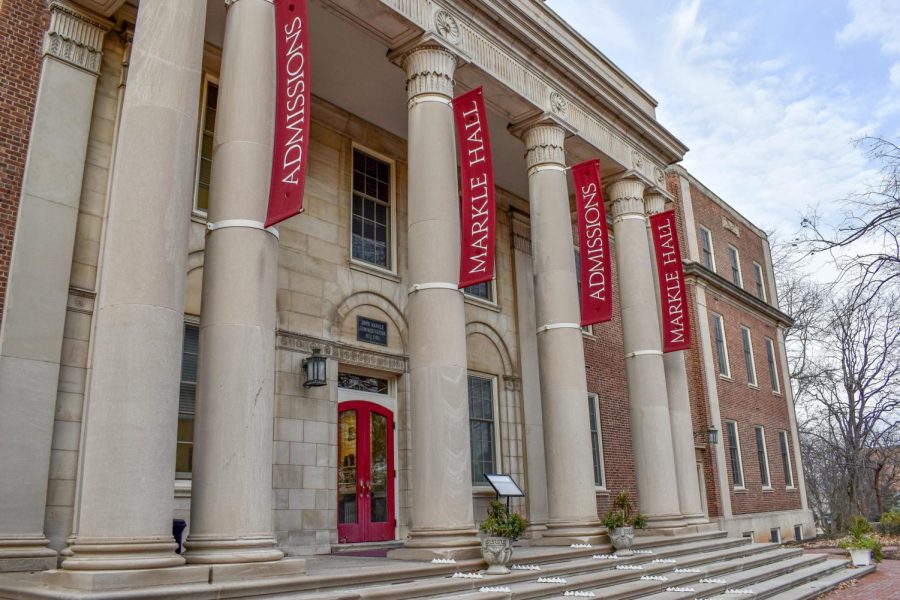Last week, all faculty department heads and program chairs, as well as certain administrators, received a letter drafted by 23 of their department head and program chair colleagues detailing the “State of the College” and “Points of Concern.”
The letter criticized “top-down approaches and bureaucracy,” claiming that “trust and institutional culture are broken,” “‘process’ is running backwards” and “shared governance and its values are imperiled,” adding that “it is time to pause.”
These points of concern were drafted during an unofficial meeting among 23 department heads and program chairs after Provost John Meier canceled a Feb. 28 meeting with them – a strategic planning session meant to replace the meeting was canceled due to weather. Meier was not contacted for comment.
The letter was published with the names of four signatories attached: women’s, gender & sexuality studies department head Mary Armstrong, history department head Rebekah Pite, mechanical engineering department head Daniel Sabatino and religious studies department head Eric Ziolkowski.
Ziolkowski, Sabatino and Armstrong each declined requests for comment. Pite did not respond to several requests for comment.
For many faculty, the canceled meeting with the provost was especially frustrating. According to Christopher Phillips, head of the English department, the meeting was said to be canceled due to a conflict with a strategic planning session. Jessica Carr, professor of religious studies, said that without the ability to engage in discussions directly with administrators, many faculty members do not feel heard by the administration.
“Pretty much everyone was shocked that the provost canceled the meeting,” Carr said. “I think that that became a point where people who really are trying to work with the administration felt like ‘how are we supposed to work with the administration if they don’t even come to the regularly scheduled meetings?’”
Psychology professor Angela Bell likewise found it notable that the provost had canceled the meeting.
“And that’s something that I have a question about as a faculty member: why is the administration canceling meetings if there’s so much work to be done on campus?” she asked.
One of the most heavily emphasized points of contention in the letter centered around the newly-created dean positions. While the engineering division has long had a division head, the administration recently created similar positions in the other divisions, such as humanities. Faculty were largely frustrated that these roles were created before the expectations and responsibilities for them were clearly defined.
In the letter, the signatories wrote that “rationales for initiatives such as the new Dean structure, for example, are moved forward based almost solely on administrative, bureaucratic needs.”
“It is frustrating for everyone, however, to take the step to create and recruit for those positions and only later decide what the job descriptions will be,” Phillips wrote in an email. “I personally think it needs to work in the opposite direction: define the role, get clarity on that across the community, then bring the person in to fill it.”
Carr said that deciding to add four new deans without faculty input conflicted with the model of shared governance that guides the college.
Many faculty, including Bell, have come out in support of the letter’s ideas.
“These are things that have long existed in my five and a half years here at Lafayette,” Bell said of the concerns raised in the letter.
Phillips echoed Bell’s sentiment.
“I think the letter was a great service to our community, as it expressed what many have been experiencing. Communication needs to improve, especially when a number of changes — especially some of our recent changes in staffing and costs — have happened quickly and without much explanation,” he wrote. “If we’re to be the community we say we want, we need to put relationships before pretty much anything else.”
Carr is currently on sabbatical. However, she said that even when more removed from the college’s politics, she is still able to sense the faculty’s discontent.
“Faculty are very united in their frustration, uniquely united in their frustration,” Carr said. “But I would not say that everyone’s frustrated about the same thing. And that is what I think is so good about the document, is that they did a nice job of summarizing the things that unite most people who are frustrated.”
The letter prompted a response from President Nicole Hurd, who wrote that she has “asked that draft job descriptions of the four new deans, as well as the vision for a position associated with interdisciplinary coordination, be shared with the entire faculty when we return from spring break.”
Hurd also addressed the other concerns raised by the faculty in the letter.
Faculty, however, were not entirely satisfied with the response.
“It seemed that she read the letter as a list of grievances to address. I don’t think that’s really what it is,” Phillips wrote. “It speaks to deep problems, and they’re problems that mainly require many of us—faculty, administration, staff, and students—to discuss together with care and trust so that we can then act together. It’s not a demand list; it’s a call for some deep dialogue.”
“This administration in particular, especially the president, gave a lot of messages that she wanted to make things better,” Carr said. “But I think that, in fact, issues of trust and issues of process feel like they’ve gotten worse.”



























































































































Robert Darbee, 67 • Mar 13, 2023 at 7:54 pm
More bureaucracy. Sounds like one more excuse to ignore Lafayette non-stop money solicitations (2-4/week).